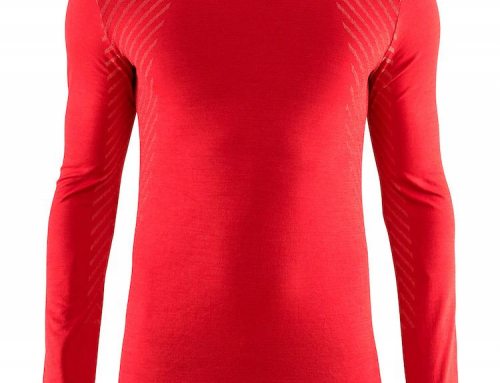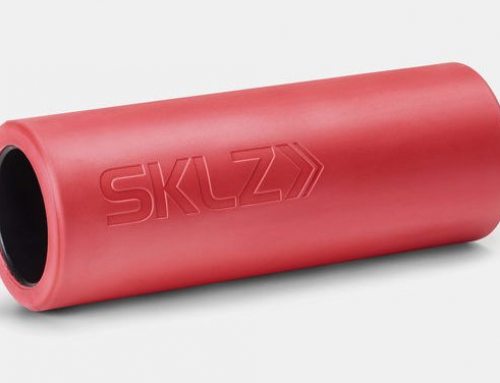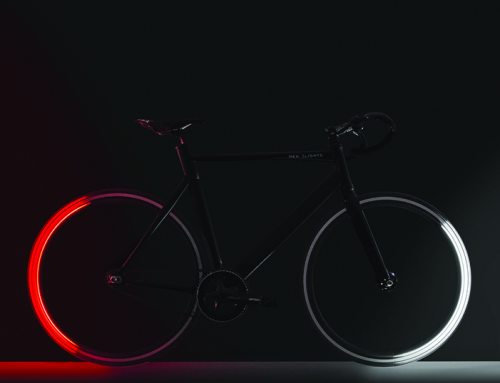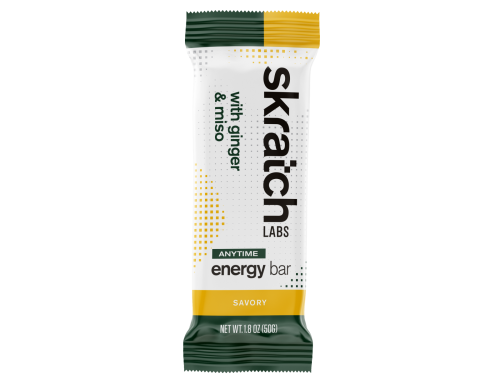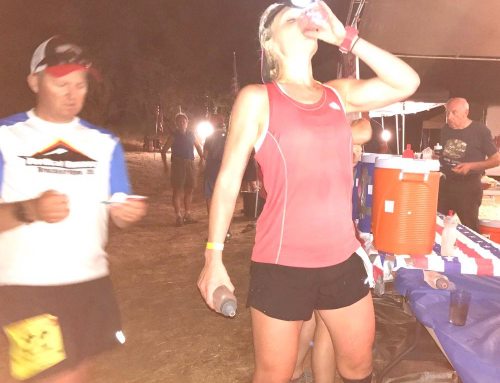By D.C. Lucchesi
Rudy Project Noyz – MSRP $175
 Built to perform, the uber-light frames of the Rudy Project Noyz feel sturdy despite their weight – or lack thereof. If it’s been a while since you’ve rocked the Rudy’s, they fit as well and look as good as you remember. With even more style, color and lens combinations (and some ladies only options) you’ll want to lace ‘em up and turn up the Noyz. The wraparound styling is still the weapon of choice for getting it on outdoors, and Rudy Project has always made this style of shades look good even off the trail, road, bike, etc. And the fit? To say “precise” would be to radically undersell this one. While the Noyz is sculpted to fit medium- to smaller-sized heads and faces, and the temples seemed to curve a little too far inward for the smallish face of our tester. Once we tweaked the rubberized Megol temple tips and nosepiece – and opened-up the temples’ reach with a few kind strokes of an emery board at the hinges – the Noyz was custom-made comfortable and secure on our faces. The Noyz comes in more frame and lens combos than you can imagine, and there are two brand-new models just for women.
Built to perform, the uber-light frames of the Rudy Project Noyz feel sturdy despite their weight – or lack thereof. If it’s been a while since you’ve rocked the Rudy’s, they fit as well and look as good as you remember. With even more style, color and lens combinations (and some ladies only options) you’ll want to lace ‘em up and turn up the Noyz. The wraparound styling is still the weapon of choice for getting it on outdoors, and Rudy Project has always made this style of shades look good even off the trail, road, bike, etc. And the fit? To say “precise” would be to radically undersell this one. While the Noyz is sculpted to fit medium- to smaller-sized heads and faces, and the temples seemed to curve a little too far inward for the smallish face of our tester. Once we tweaked the rubberized Megol temple tips and nosepiece – and opened-up the temples’ reach with a few kind strokes of an emery board at the hinges – the Noyz was custom-made comfortable and secure on our faces. The Noyz comes in more frame and lens combos than you can imagine, and there are two brand-new models just for women.
The interchangeable wraparound lenses offered full coverage and excellent visual clarity – even with the entry level lens in our test model. The lens options for the Noyz run from completely clear to incognito dark, with polarized and photochromic options, too. The lenses snap in and out quickly and the hardshell case has an interior lip to carry extra lens sets. The Noyz is made to play outdoors, and it means business. Trail runners or other outdoor athletes looking for precise optics, eye protection and comfort will easily see why the Rudy Project has earned its reputation for quality and performance. Our recommendation: go with Rudy’s photochromic lens on the Noyz frame to avoid the pre-run decision-making of which lens is best for today’s trail conditions or the need for any trailside lens changing.
Rudy Project Ability – MSRP $174.99
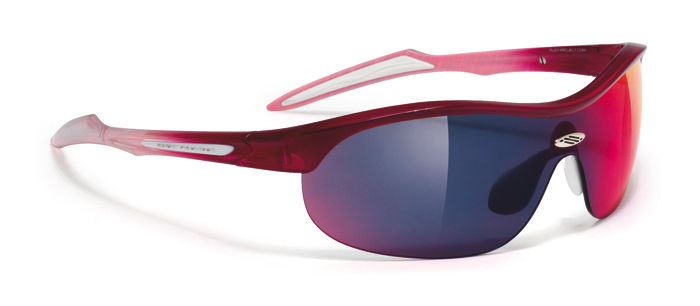 Ladies get both high function and high fashion in the new for 2010 Rudy Project Ability. Designed just for women, these sunglasses look as good behind the wheel in the carpool line as they would at the front of the pack on race day. Rudy Project doesn’t play. These are serious specs meant to perform and look good doing it. And face it, if you’re going to drop some coin on a pair of good – make that great – sunglasses, wouldn’t it be nice if they looked good in civvies, too?
Ladies get both high function and high fashion in the new for 2010 Rudy Project Ability. Designed just for women, these sunglasses look as good behind the wheel in the carpool line as they would at the front of the pack on race day. Rudy Project doesn’t play. These are serious specs meant to perform and look good doing it. And face it, if you’re going to drop some coin on a pair of good – make that great – sunglasses, wouldn’t it be nice if they looked good in civvies, too?
The Ability’s wraparound coverage fits just close enough to offer full protection from sun, wind and then some, but not so close that we felt claustrophobic in them. The superlight frames have something to do what that. Scarcely tipping the scales at under an ounce for the frame and lens, the Ability sits on the face lightly and comfortably. A fully adjustable nosepiece and hidden rubberized temple tips keep the glasses in place. And as with all Rudy Project lenses, the optics are top-notch, providing distortion-free vision even at the outer limits of the wraparound lens.
The frames did make a “plastic-y” squeak when opened up to put on our face which was a bit disconcerting. The removable/interchangeable lens was a bit of a struggle to wrest from the frame, so we called Rudy Project customer service for guidance. They said it did require some “elbow grease” to make the switch, but assured us that we were in no danger of damaging the frame. Good to know. The Ability comes in five different frame colors and equally as many lens options so you can have the look you want and the performance you’d expect from a sunglass of this caliber and price tag. The raspberry fade of our test frame paired up nicely with the smoke-colored lens to look strong and feminine but not girly.
Ryders VTX – MSRP $59
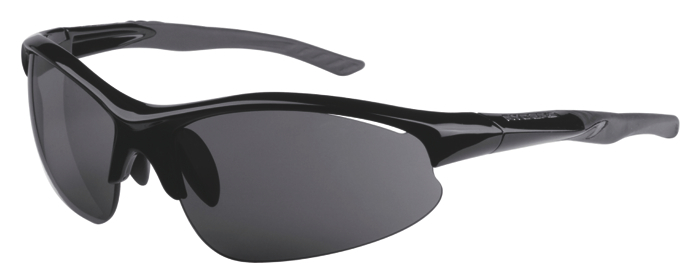 The Ryders Eyewear VTX looks like your standard wraparound sport sunglasses. And at this price point, you’d expect them to be a decent pair of glasses, but not great. But as the Ryders rep we talked to put it, “we think you get a little more for your money when you buy Ryders.” And with the Ryders VTX you really do. While you won’t find some of the nuances that make for eyewear costing twice or even three times as much, Ryders makes it tough for shops to make a convincing argument that customers should spend any more. The VTX comes out of the box with a near perfect fit for medium-sized heads. Our gloss black frameset looked as good as most any in this category, but without any headturning graphics or color schemes. The VTX does come in two other equally subdued frame colors: brown stripe and pearl grey. The anti-slip nosepads and temple tips helped us dial in the fit and the frames stayed in place even during the downpour we encountered through one of our test runs.
The Ryders Eyewear VTX looks like your standard wraparound sport sunglasses. And at this price point, you’d expect them to be a decent pair of glasses, but not great. But as the Ryders rep we talked to put it, “we think you get a little more for your money when you buy Ryders.” And with the Ryders VTX you really do. While you won’t find some of the nuances that make for eyewear costing twice or even three times as much, Ryders makes it tough for shops to make a convincing argument that customers should spend any more. The VTX comes out of the box with a near perfect fit for medium-sized heads. Our gloss black frameset looked as good as most any in this category, but without any headturning graphics or color schemes. The VTX does come in two other equally subdued frame colors: brown stripe and pearl grey. The anti-slip nosepads and temple tips helped us dial in the fit and the frames stayed in place even during the downpour we encountered through one of our test runs.
Additionally the VTX comes with three sets of interchangeable lenses: dark grey flash, orange and clear, allowing 15% to 99% of available light into the eye. That’s enough range for nearly any light conditions the trail can throw at you. All three lenses provide 100% UVA, UVB, and UVC protection, too. Ryders was no doubt thinking of outdoor abuse in the design of the VTX, with lightweight, shatterproof polycarbonate lenses and the Duraflex frame material. The lined hardshell zippered case, three sets of lenses and the incredibly low price make the Ryders VTX a matter-of-fact choice for any runner wanting serious quality sunglasses without high frills or a high price tag.
Ryders Hex – MSRP $39.99
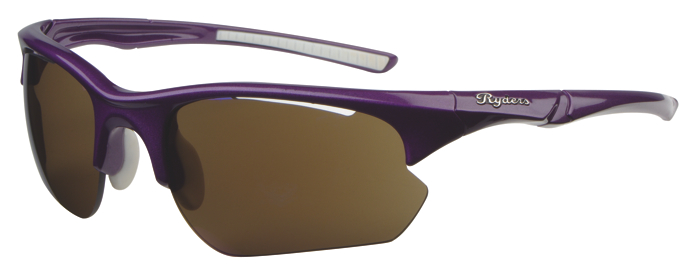 If the freedom from split times, heart rate monitors and other high-tech gadgetry is what turns you on about trail running, we have found the sunglasses for you in the Ryders Hex. This “essential” model from Ryders Eyewear is just the ticket for those looking for great fit and basic function without a ton of fussy features and the price tag that comes with them.
If the freedom from split times, heart rate monitors and other high-tech gadgetry is what turns you on about trail running, we have found the sunglasses for you in the Ryders Hex. This “essential” model from Ryders Eyewear is just the ticket for those looking for great fit and basic function without a ton of fussy features and the price tag that comes with them.
The Hex has a medium fit, making it just about right for all but the smallest or largest of head sizes and comes with lightweight polycarbonate lenses. Three not-so-flashy frame colors – gloss black, pink and purple – give you some choices, and the available lens colors provide 100% UVA, UVB and UVC ray protection. Anti-slip nosepads and temple tips keep the lightweight package in place on even the sweatiest runs.
The Duraflex frame is purportedly made from the same material as the other Ryders model we tested (Ryders VTX), but seemed to feel a bit more flimsy, but Ryders contends the frame material is just as durable and flexible as their other models.
Runners on a budget or those unwilling to pay a ransom for eye protection will appreciate the Hex for its better-than-basic fit and design. In its defense, it looks as good as anything out there and performs as well as specs costing much, much more. However, if you want options and features like greater adjustability, interchangeable lenses and other bells and whistles, a $20 upcharge will put you in a Ryders model with all that and still won’t break the bank. We liked the Ryders Hex as a great, entry-level or budget sunglass, and at this price there’s no reason to hit the trails without eye protection. The Hex would also be a great spare pair for use in race day drop bags where you wouldn’t want to leave your high-dollar, super-tech specs lying about in the elements.
Julbo Trail – MSRP $160
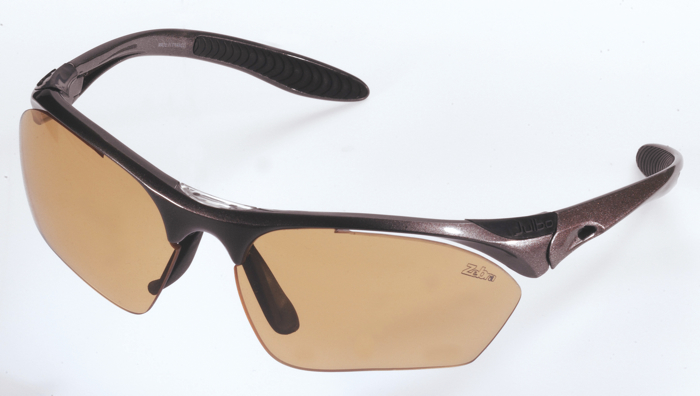 The Julbo Trail is the only sunglass in this review – and the only company period, according to Julbo – that uses a soft, flexible photochromic lens. So flexible in fact, we bent them back around to form a perfect letter “C” and they bounced back with only our grubby fingerprints as proof. The frames were nearly as pliable, making the entire package feel as though it could take a serious hit from a tree branch or fall (it happens) without so much as a scratch or even the wearer’s tears as evidence.
The Julbo Trail is the only sunglass in this review – and the only company period, according to Julbo – that uses a soft, flexible photochromic lens. So flexible in fact, we bent them back around to form a perfect letter “C” and they bounced back with only our grubby fingerprints as proof. The frames were nearly as pliable, making the entire package feel as though it could take a serious hit from a tree branch or fall (it happens) without so much as a scratch or even the wearer’s tears as evidence.
The photochromic ZebraSoft lens transitioned from shade to sun and back again almost unnoticeably and quite quickly – but not so fast that our eyes couldn’t adjust along with the change. We also liked how well ventilated the Trail felt, allowing just enough air flow to keep things from fogging up even with the brim of our cap pulled low. The adjustable and skid-proof nosepiece kept the Trail from sliding down, but the downshot of its extremely light weight made it a bit bouncy on the most rugged descents. There is also some slight visual distortion at the very bottom edge of the unframed lens. Our test model came in a very run-of-the-mill black frame color, which belies the overwhelming features of the Trail, but Julbo also offers it in a sharp-looking red and conservative-but-colorful mocha. There’s also an optional RX clip.
The Trail is Julbo’s first-ever model designed specifically with trail running in mind, but its light weight, comfort and other well thought-out features give it killer crossover qualities for most any endurance or outdoor pursuit. In the woods, on the roads – or under your helmet, the Julbo Trail is will have the swimmers among us wishing their goggles were this good.
# # #
D.C. Lucchesi runs himself ragged on the trails and lives to tell (and write) about it on his blog at http://dirtyjokesandstories.blogspot.com. If you’d like to join the fun, email him at dc@runforyourlife.com.


